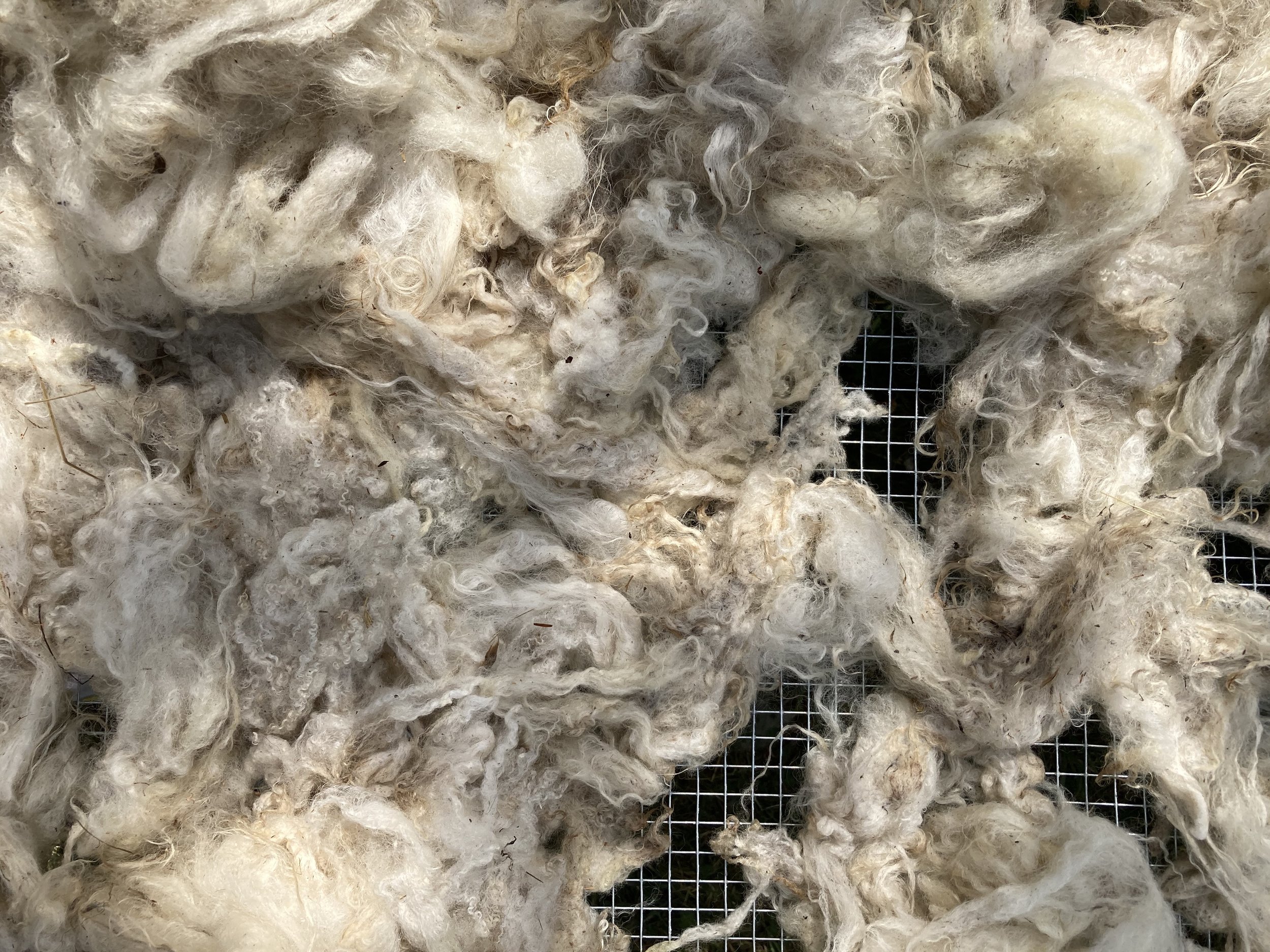Know Your Wool (KYW): Where does our wool come from?
Last updated: May 26, 2025
Woola’s products are made of waste wool that would otherwise be burned or buried. The type of wool we use is too coarse to produce yarn for the textile industry.
But where does this wool come from? How do we ensure the wool is responsibly sourced? How do we know that it comes from farmers who share our values, especially when it comes to prioritising animal welfare?
Just like the financial sector has a standard Know Your Customer (KYC) due diligence process, Woola has a Know Your Wool (KYW) process.
From UK farms to locally sourced wool
Image source: Postimees
In the early days of Woola, we relied completely on leftover wool from the United Kingdom, which has long-standing sheep farming traditions and the most sheep in Europe.
As such, it’s no surprise that the UK has the most developed methods of processing any quality of wool. This made it the most accessible source of leftover wool for us to kick off our production.
From the very beginning, we set high standards when choosing our suppliers to make sure the sheep are treated well throughout the supply chain. But there are a lot of grey areas in the wool industry, and in many cases, not a whole lot of transparency or traceability.
So, in 2022, we set up local wool sourcing. We switched to sourcing wool directly from local farmers in Estonia, whom we could personally meet and visit.
Our new way of sourcing the material serves two key goals when it comes to sustainability. It allows us to:
Really know our wool, and
Lower our transport emissions.
Setting the scene: sheep farming in Estonia
Before we dive into the specifics of our Know Your Wool process, let’s get to know Estonia’s sheep farming a bit.
All of the facts and figures below are taken from Estonia’s Ministry of Rural Affairs’ Sheep Farming Development Plan for 2018-2023, unless noted otherwise.
Low profitability, high percentage of sheep farming for own consumption
Although shepherding has a long history in Estonia, it hasn’t been a lucrative business in recent decades due to the lack of appropriate supply chains. As a result, Estonia doesn’t have factory farms, and most sheep farmers only own small flocks.
Only 14% of all sheep farmers in Estonia own more than 100 sheep.
It’s also worth noting that organic sheep farming is very common, as about 63% of all sheep in Estonia are raised following organic agriculture standards.
To make it even clearer just how small the industry is in Estonia: there are only a handful of professional sheep shearers in the entire country.
Since Estonia’s wool industry isn’t well-organised and there’s a lack of supporting services (such as washing and carding) required to make it a viable business, sheep aren’t really grown for their wool. This also means as much as 90% of the wool goes to waste.
So, it’s true that sheep in Estonia are primarily raised for meat. As the prices aren’t very competitive, it’s done mainly for farmers’ own consumption and not for commercial distribution.
Additionally, sheep farming plays an important role in protecting the biodiversity of Estonia. As sheep graze, they help maintain the ecology and landscape of the area. This is also one of the key reasons why sheep farming in Estonia is generously subsidised, given that commercial sheep farming isn’t lucrative.
Standards of regulation
The small size of the Estonian sheep farming industry doesn’t mean there’s a lack of regulation.
On the contrary, all sheep farmers are legally obliged to register with the Agricultural Registers and Information Board (PRIA).
Once registered, they’re automatically subject to regular audits from the Agriculture and Food Board (PTA), which issues precepts if the animals aren’t well taken care of or if the farm has any issues that must be attended to.
The best part? This is all public information — anyone can look up a sheep farm to see if it’s been issued precepts regarding its farming practices.
You can also check for registered sheep farms, review their reason for keeping sheep, and view the farm area visually on a satellite-view map.
You can even see the sheep on the map in many cases! Here’s an example of one of our wool suppliers:
Image source: PRIA
Our KYW process
The Agriculture and Food Board’s audits are independent third-party reviews and offer a great starting point for Knowing Your Wool. We’ve taken our KYW process a few steps further.
5 KYW criteria that must be met
Woola’s KYW process requires that the sheep farmer meets the following five conditions:
The sheep farmer is registered as an animal keeper with the Agricultural Registers and Information Board (PRIA).
They don’t have any precepts against them from the Agriculture and Food Board (PTA).
They provide their sheep with free-range outdoor space.
They provide sheep with cover in case of changing weather conditions.
The sheep are “Woola-happy” (we cross this checkbox only if we'd be happy to live there as sheep).
While we don’t share our KYW tracking database publicly, here’s a sneak peek of what it looks like, with a couple of example farms we visited in July 2024:
Keeping track of our wool
We keep track of important information on each batch of waste wool we source and process. This information includes:
The amount of wool we source from each farm.
The age of the wool.
Whether we’ve completed an in-person visual audit.
The wool’s colour.
The scouring date (to determine if the batch has already been processed and used to make Woola products).
The storage method.
This kind of due diligence helps us ensure sustainable practices throughout our supply chain and production — up until the point you and your team receive our packaging.
Following our Know Your Wool process, we can be confident that the wool we use is sourced responsibly and sustainably. With this transparency into our process, we hope you have the same confidence in Woola.
Keep up with our updates (and fun The Office-inspired Woola Shorts) by following us on social media: Facebook, Instagram, and LinkedIn.
If you’d like to try Woola packaging, request a free sample or chat to our sales team.
Frequently asked questions
-
Wool is a fibre grown by sheep. The fleece that sheep grow keeps them warm during winter and cool during the summer. Wool has to be sheared for sheep’s health and general well-being.
In Europe, wool is a by-product of sheep farming in most cases. As there is not a lot of demand for European wool that’s too coarse for the textile industry, farmers often simply compost or burn it.
Some breeds of sheep (such as Merino) are reared for their fine wool, predominantly in Australia and New Zealand.
-
Waste wool is any wool that goes unused due to a lack of demand. Most commonly, it’s deemed unfit producing retail textiles. The high-grade wool used for clothing and other commercial textiles is superfine and soft, while waste wool is coarse.
Waste wool still has all the great properties of wool:
Regulates temperature
Water-resistant
Shock-proof
Fire-retardant
Looks and feels premium
These properties make wool an excellent replacement for plastic packaging.
-
While it’s a material that would otherwise go to waste, the only sustainable way to source it is to pay sheep farmers fairly for their produce.
Rearing sheep and shearing their fleece involves considerable costs, so we have agreed on prices that are fair and help us build long-term working relationships with the farmers.
That said, the cost of waste wool is a fraction of other expenses required to turn the raw material into wool packaging: from washing and carding all the way to paying our employees who pack up the orders.
-
Knowing where your wool comes from matters for a number of reasons:
It ensure the wool is responsibly sourced.
It ensures long-term sustainability by encouraging responsible farming and biodiversity.
It provides clarity on the treatment of animals in the supply chain and ensures they aren’t suffering cruelty.






